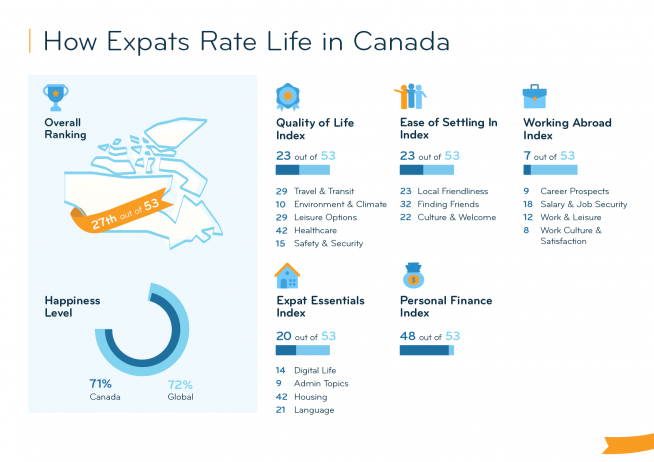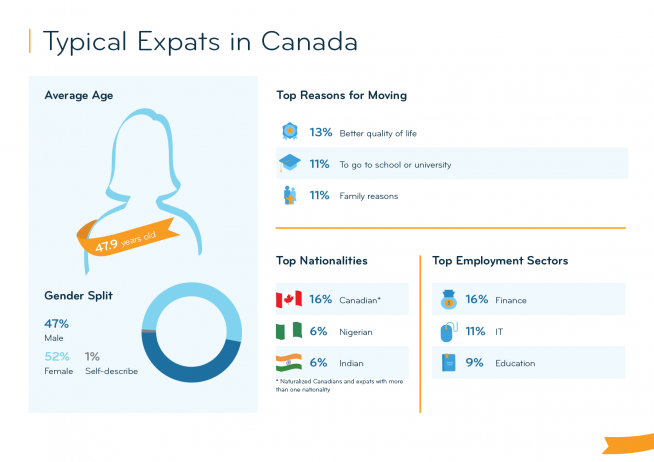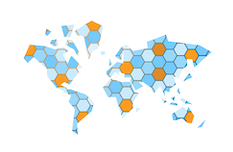Great Career Options for Expats in Canada Come with Drawbacks
Canada comes 27th out of 53 destinations in the Expat Insider 2023 survey. Expats love their working life and highlight the great work culture and job market. However, the cost of living makes life in Canada hard for many. While they enjoy the local urban environment, they often find medical services inaccessible. Luckily, they report that dealing with the local bureaucracy is not an issue, though getting a visa can be tough. Overall, 71% of expats are happy with their life in Canada, compared to 72% globally.
A Flexible Work Culture & Excellent Career Options
Working Abroad (7th) is Canada’s strongest point. Expats especially love the Work Culture & Satisfaction (8th) and their Career Prospects (9th). Among other things, they appreciate the way in which Canada’s business culture promotes flexibility (77% happy vs. 60% globally), independent work (61% vs. 46% globally), and creativity (63% vs. 51% globally). About two in three expats (65%) also rate their personal career options positively (vs. 57% globally), while nearly three in five (59%) are satisfied with the local job market (vs. 47% globally).
“Here, you can choose your field of work, as long as you show motivation and professionalism. It’s not everywhere that you will get the opportunity to change careers from one day to the next.” – French expat
Disillusioned by High Cost of Living
The survey reveals a glaring drawback to life in Canada. Though the country comes in an above-average 19th place for fair pay at work, many expats struggle with their finances. In the Personal Finance Index, Canada ranks a subpar 48th out of 53 destinations, featuring among the bottom 10. The country has never done well in this regard during the past ten years of the Expat Insider survey — it has even ended up in the bottom 10 since 2018.
In 2023, nearly half the expats in Canada (49%) consider the general cost of living too high, compared to 35% worldwide. Unsurprisingly, another 40% do not agree that their disposable household income is enough to live comfortably in Canada (vs. 27% globally).
A Welcoming Culture & Easy-Going Residents
In the Ease of Settling In Index, Canada lands in a decent 23rd place. More than seven in ten expats (71%) describe the local population as generally friendly towards foreign residents (vs. 65% globally). Roughly the same share finds it easy to get used to the local culture (69% happy vs. 62% globally) and feels welcome in Canada (70% happy vs. 67% globally).
Stress-Free Bureaucracy, Stressful Housing Market
Canada claims an above-average spot in the Expat Essentials Index (20th). It especially benefits from its strong performance for Admin Topics (9th). Canada makes it into the global top 3 for the ease of opening a bank account, and 59% of expats also find the local authorities easy to deal with (vs. 39% globally).
Though expats enjoy a comparatively hassle-free bureaucracy, they face a rather tough housing market. Canada only ranks 42nd out of 53 in the Housing Subcategory. Affordability, or rather, the lack of it, is a particularly big problem: 58% of expats say that housing is not affordable, 16 percentage points more than the global average (42%).
Great Environment, Not so Great Healthcare
Lastly, Canada’s ranking of 23rd in the Quality of Life Index hides a stark contrast among its subcategories. On the one hand, Canada offers its expat residents relatively high Safety & Security (15th) and a superb Environment & Climate (10th). Among the respondents, 77% agree they can openly express themselves and their opinions (vs. 65% globally). They also love the urban environment (9th), the availability of green goods and services (10th), the air quality (13th), and the natural environment (15th).
“I don’t like how hard it is to get access to a family physician and how long the waiting times for medical examinations are.” – Expat in Halifax
On the other hand, Canada does very poorly in the Healthcare Subcategory (42nd): 28% rate the availability of healthcare negatively (vs. 14% globally), and 30% do not have easy access to all medical services they need (vs. 19% globally).





